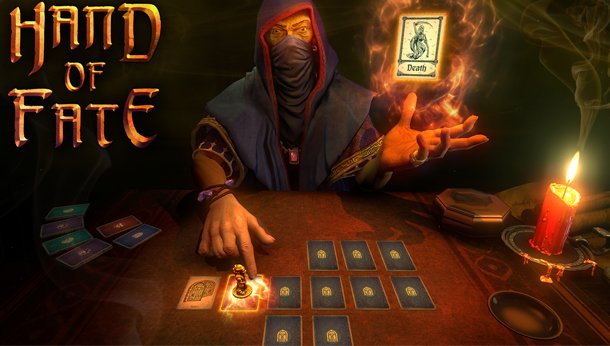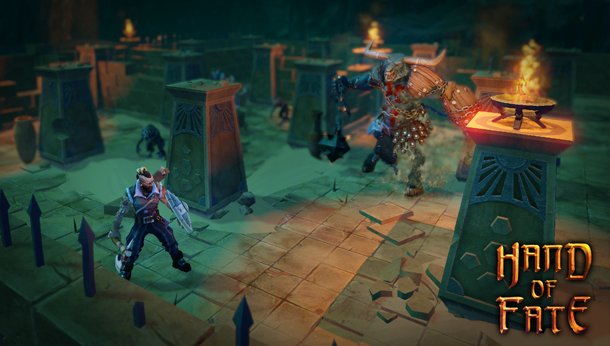Hand of Fate deals cards and brutality in equal measure

“I absolutely think today is the best time there ever has been to make a game for a specific audience,” says Morgan Jaffit from Australian indie developer Defiant. He's talking about the Brisbane studio's new game Hand of Fate, which fills a niche that's not so much tiny as it is nonexistent.
This is a game which combines card-based RPG systems with real time 3D combat, spiced with a bit of rogue-like randomness. Hand of Fate tasks players with selecting cards and making narrative-based decisions, which then help determine the way real time 3D action sequences play out in over 70 battle arenas.
The concept itself is unusual, but it may come as a surprise that it's the work of a studio best known for Ski Safari, a whimsical endless runner which topped the paid apps section of iTunes in several regions, including Australia. Successfully funded on Kickstarter last year, the game is currently playable in beta form.
“We knew that we were making a game for a niche audience, and we needed people who were on the Venn diagram where they play and enjoy both card games and action games,” Jaffit said.
“We know that the intersection point won't be as big as either of those groups [on their own], but I think that our overall approach is that we can make those people very happy and that will be okay. I think that is how games work nowadays.”
In an industry which thrives on expensive marketing campaigns designed to pique the interest of virtually every person with a gaming machine, it's refreshing to hear a developer admit that his team's game is niche. Given the game's unique concept though, any estimation of its potential reach is speculation. With PC and PS4 editions confirmed - and talks in progress with Microsoft about the Xbox One - plenty of people will have a chance to give it a go.
“We'd prefer to make a small group of people happy rather than to stretch it out into something that appeals to everyone,” Jaffit said.
The biggest gaming news, reviews and hardware deals
Keep up to date with the most important stories and the best deals, as picked by the PC Gamer team.
“We knew going in that there was going to a large group of people who'd say 'I love card games but I love them because they are a bit sedate' while on the other side we'd have those who'd say 'I like action games but I don't want to do any reading or deckbuilding'.”
“But I do think we've also made the game more accessible on both sides since our first showing at PAX Australia [in 2012],” he continued. “At the first PAX we did have people wander up and they'd be very clear about [which genre they preferred], whereas at the most recent PAX we were beguiling all sorts, and once they spent time with it they really enjoyed it.”
Hand of Fate is currently in beta, but it's showing immense promise. The game begins with a dealer placing a selection of cards on a grid. Players are prompted to make decisions as they select these cards, ranging whether to ignore or ascend a set of stairs, or whether to rob or ignore a passing nobleman. If action is taken, a further set of cards will appear with a selection of success or fail states, and one of these must be selected at random to determine the outcome.
Occasionally a card will whisk you away into a 3D battle arena. Each card won throughout the session will determine how well-equipped your character is in battle, and as you defeat each of the game's twelve core boss enemies you'll permanently gain access to weapons, armors or abilities.
These permanently won cards can be customised before each round in the game's deckbuilder, which unlocks when you've defeated the first boss. Cards owned permanently are usually won by defeating bosses, though Jaffit says there are other methods of acquiring them.
Questioned on how the genre mashing concept came about, Jaffit simply cites a love for both action and card games.
“We play a lot of board games and card games in the office: Dominion was a strong favourite for quite a while. In addition, a lot of the team are pretty engaged in playing the God of War and Arkham games. Arkham is one of my favourite personal games and our lead combat programmer is also very enthusiastic about the Batman games.”

The Arkham influence is apparent: hand-to-hand combat scenarios are straightforward, brutal and satisfying. Usually several enemies will attack at once, with meters indicating their attack status. You'll ignore these meters at your peril. While the system takes some time to learn, chaining together attacks, dodging, stunning and counterattacking gradually becomes second nature, and the relatively stress-free early encounters promise to become increasingly complex as new cards and systems enter the decks.
Meanwhile, the game's rogue-like elements were inspired by the studio's desire to iterate on a randomisation system Defiant had implemented in Heroes Call, a tablet and smartphone free-to-play RPG released in 2012.
“We had a lot of randomisation in Heroes Call but it didn't work very well,” Jaffit admits. “It was a lot of work to build those systems but the players didn't really get it. We had things where you could approach any bit of content at any level and that was just mystifying to players who probably thought it was a linear game anyway.
“The card metaphor came out of our conversation about whether we should cut the randomness completely and make a linear game, or whether we should lean on all that stuff we learned about making interesting random systems. That lead to the conversation about cards because they can communicate that [randomness] really well, and that lead to a conversation about deck building because that gives players control of it.”
While Hand of Fate was originally slated for an early 2014 release, Jaffit says the game may be a few months away yet. “It's ready when it's ready,” he said. In the meantime, access to the beta can be found on the official Hand of Fate website .

Shaun Prescott is the Australian editor of PC Gamer. With over ten years experience covering the games industry, his work has appeared on GamesRadar+, TechRadar, The Guardian, PLAY Magazine, the Sydney Morning Herald, and more. Specific interests include indie games, obscure Metroidvanias, speedrunning, experimental games and FPSs. He thinks Lulu by Metallica and Lou Reed is an all-time classic that will receive its due critical reappraisal one day.

